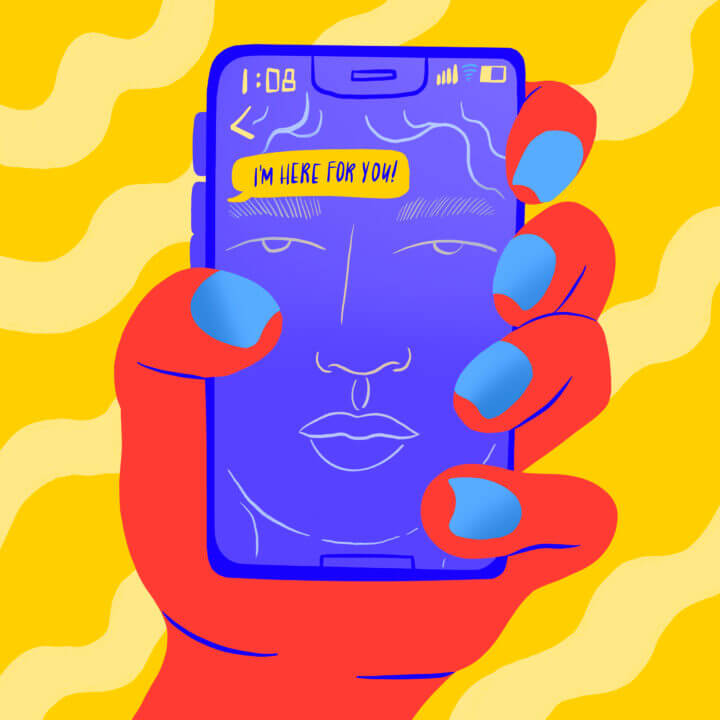The 2020 presidential election is quickly approaching and we at The Trevor Project have seen young people reach out to us with a wide range of emotions. These emotions vary in terms of feelings (e.g., anger, sadness, frustration, hopelessness), and many of them are intense. And it’s important to recognize that these responses we are seeing to the impending election are also coming on the heels of a global pandemic and a social justice uprising against anti-Black violence and racism. Some people are worn out and exhausted while others feel activated and motivated. We as an organization wanted to take a moment to acknowledge that folks are struggling and to offer some guidance about what you can do during this time to feel better and take care of yourself.
We know that the current moment may be particularly hard for LGBTQ youth. There are many political conversations pertaining to our next president, the Supreme Court, and even local elections that have the potential to directly impact the civil rights and daily lives of LGBTQ youth — at every intersection of their identities. We’ve been hearing from many youth who are experiencing fear, anxiety, and even panic in anticipation of the election results, including some who are having trouble living with family members or around neighbors with whom they disagree politically. If you are experiencing these emotions you are not alone.
Seeing and hearing about anti-LGBTQ policies and remarks can be extremely difficult, hurtful, and terrifying. According to our research, 86% of LGBTQ youth said that recent politics have negatively impacted their well-being. It can be incredibly painful to feel like you have to defend your existence as an LGBTQ person or have to debate with others about whether you deserve equal rights and the ability to live your life as your true self. It’s more than just politics, it’s personal. It’s personal to us too.
For some, this emotional stress can present itself in the form of physical symptoms, including an inability to concentrate on school, lack of sleep, and nausea. In the midst of all of these intense emotions and uncertainty, it is so important to take care of yourself and to prioritize your mental health.
The Trevor Project is here for you 24/7, and we can help you understand and manage any anxiety and stress you may be experiencing. Together, let’s explore some coping strategies and action steps. And remember, there is no correct way to process or respond to what is going on in the world right now. It’s key to find what works best for you.
What can I do to take care of myself?
- Find calm. With everything going on, this can seem like an impossible task but think long and hard about what makes you feel relaxed and at ease. That could involve listening to music, working out, doing yoga, meditating, or cooking. Or it could involve small things that make you feel better, such as taking a moment to enjoy a piece of candy, play with your pet, or start a new game. Look out for the little things each day that bring you joy and help reduce stress.
- Unplug. If you are ever feeling overwhelmed by the news or social media, do yourself a favor and take a break. While it can be great to stay informed, the world might seem like way too much right now. We urge you to find time each day to disconnect from ALL screens — no phone, iPad, computer, or TV. Or at least set firm boundaries for yourself, like no screen time right before bed. Use this time to center yourself and try to process your emotions without input from others.
- Sleep. Disconnect from your devices — even leave them in another room — and try your hardest to get eight good hours of sleep each night. Allowing our bodies to rest is essential for our physical and mental health, and a proven way to reduce stress.
- Pivot to action. When things are out of your control and you start to feel helpless or hopeless, channeling your energy into taking action can help. These actions could involve political activism, volunteer work, donating to organizations you care about, registering others to vote, or helping folks locate and get to their polling place.
- Empower yourself through education. If you find yourself having a hard time disconnecting from social media, try pivoting to more reliable news sources. Explore media and literature that reflect more nuanced and positive LGBTQ representation. Education is power and learning more about the issues you care most about can help you gain the confidence to express yourself, have difficult conversations, and help educate others.
- Express yourself. While it might be difficult to translate your complex thoughts and feelings, try to find comforting ways to express yourself, and even speak out for what you believe in. That could include creative outlets like journaling, drawing, painting, and dancing, or posting on your social media about an issue you care about.
- Connect with support systems. Whenever you feel surrounded by too much negativity, make time to connect with the people in your life who accept and validate you for who you are. These positive connections are vital for our mental health. If you are not out to anyone in your life and are looking for an affirming community online, try starting with TrevorSpace.org. It can be a great way to build community with fellow LGBTQ young people who might be going through similar experiences.
- Get help. If you are ever feeling hopeless or suicidal, or simply need to talk with someone to help you process your emotions, please contact The Trevor Project. There are also other resources including online counseling or psychotherapy, and apps that you can download on your phone with helpful mental health resources.
Approach difficult conversations with care — and pick your battles.
You may have parents, relatives, friends, neighbors, or other people in your life who have strong feelings about a certain candidate or issue that you disagree with. This can be incredibly hard, frustrating, and invalidating as an LGBTQ young person.
If you’re ever considering engaging in a political discussion with someone in your life, first consider whether it’s worth it. You may feel the need to try and change someone’s mind, but the decision to put yourself in a situation that could threaten your mental and emotional health should be one that you make carefully. You cannot control how someone may respond to you, but you can set expectations for yourself. We also want to acknowledge that some of these conversations happen not because you think you can change the other person’s mind, but because you feel like you need to stand up to the person saying hurtful things to you. In either case, I would like you to first consider these questions:
- What is your motivation for having the conversation? What would you like to get out of it?
- Have you ever had a conversation like this before? How did it go?
- How comfortable are you talking about this topic?
- How does your experience as an LGBTQ person inform your point of view?
- What aspects of the subject do you find challenging?
- What are your assumptions about the other person’s understanding?
- What environment and time do you think would be the safest to engage in this conversation?
After thinking it through, you may decide that you no longer want to have the conversation, and that’s okay!
If you do choose to have that discussion, it’s critical to make a safety plan. This can include making alternative arrangements for housing, food, or transportation in advance. And then upon entering the conversation, consider communicating any ground rules that might help to create a safe space for you to express yourself, such as only allowing one person to speak at a time. If these ground rules are not respected, or the discussion ever reaches a point where it is no longer productive or safe for your well-being, consider putting your safety plan into action and ending the conversation.
The process of having difficult conversations does not begin or end with the discussion itself. It is essential to consider your mental health and wellness at each step in the journey, especially if you are having these conversations with people you live with.
If you have the ability and can do so safely — vote!
Voting is one way that we can make our voices heard. But it is also a decision that can bring up emotional challenges and anxiety. And now we must also factor in how to vote safely during a global pandemic.
- Make a plan to vote that follows public health guidelines around COVID-19. It is essential to prioritize your personal safety as you make a plan to vote, whether it be by mail, early, or in-person. The nonpartisan organization Vote.org has gathered all of the information you need to vote and is sharing real-time COVID-19 election updates.
- Prepare for potential barriers. Many youth, especially those voting for the first time this year, may encounter barriers to voting, including voter ID laws and other confusing policies around voter registration, polling locations, or mail-in voting. In particular, transgender and nonbinary youth may face unique challenges, such as inconsistencies between the name/gender marker on their ID and voter registration.
To find out if your state has any voter ID requirements, check out HeadCount’s Voter ID Requirements page. And if you experience any problems while voting, you can call 866-OUR-VOTE, a national hotline that is staffed with experts to answer your questions.
It’s important to note that many LGBTQ youth are ineligible to vote in the upcoming election due to their age (under 18), immigration status, or complications around voter registration. Even if you cannot vote in the election, remember that you can still contribute to political engagement and to conversations about what’s important to you. Your feelings and experiences are valid, and they can help educate others and bring about change.
Never give up.
So many things may seem to be out of your control right now and this can understandably lead to negative emotions. Each day, if you can, you should check-in with yourself about your mental health, set boundaries, and be honest about when you need to take a break.
And don’t give up. Your life is valuable and you are not alone.
Regardless of what happens on Election Day, The Trevor Project will continue to be here 24/7 to support the unique needs of LGBTQ youth. And we’re not going to stop fighting — through advocacy, research, education, and more — to make the world a better place for LGBTQ people because you deserve to live your life free from discrimination and fear.
The Trevor Project is prepared to support LGBTQ youth throughout this process — before, during, and after Election Day. We are here for you no matter what, and you can be there for yourself, too!
Warmly,
Tia Dole (she/her), Ph.D.
Chief Clinical Operations Officer
The Trevor Project
Help us continue to provide 24/7 support to LGBTQ+ young people and empower allies to deepen their commitment through advocacy, education, and affirming content.



